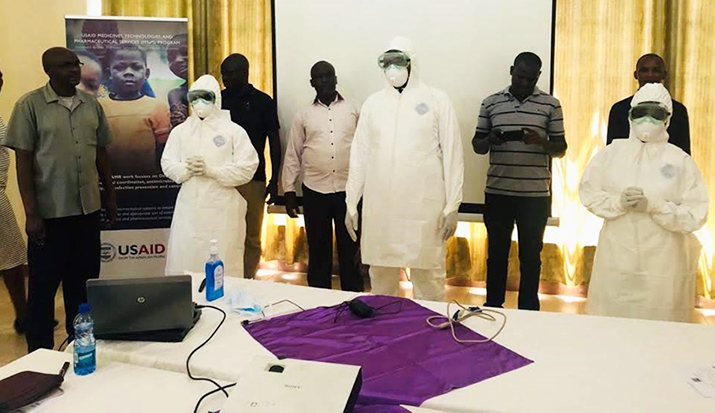MTaPS Expands Trainings to Contain the Spread of COVID-19 in Kenya
MTaPS Expands Trainings to Contain the Spread of COVID-19 in Kenya
![[Participants relax after an infection prevention and control training in Kisii, Kenya.] {Photo credit: Doris Bota/MTaPS}](https://msh.org/wp-content/uploads/2020/05/photo_mtaps_kenya_story.715px.png)
Since March 18, 2020, the USAID Medicines, Technologies, and Pharmaceutical Services (MTaPS) Program has been collaborating with the Kenyan Ministry of Health (MoH) to roll out a series of training-of-trainers (ToT) courses to help the government contain and manage the COVID-19 pandemic. The MoH and MTaPS have worked with other partners to step up their efforts and expanded the trainings to cover a wider cross-section of areas critical to battle the outbreak, including infection prevention and control (IPC), case management, sample handling, waste management, and health worker and patient safety.
“Thanks to the training-of-trainers courses provided by the USAID MTaPS team, our capacity has grown exponentially. Currently, we have trained 182 health care personnel and we continue to train more. Our confidence and competence enhanced from the training has helped us to handle suspected and probable cases with a high sense of professionality.”
– Dr. Weldon K. Kirui of Longisa Hospital, Bomet County
The county cluster ToT training courses targeted 260 health care workers from 33 counties, comprising clinicians, nurses, surveillance officers, IPC coordinators, and laboratory technologists. Subsequently, the ToT trainees organized county-level trainings, ultimately reaching 836 health care workers.
The training participants developed skills on how to rapidly identify, isolate, and care for C0VID-19 patients. Participants were also equipped with knowledge and skills on risk communication for health care providers, communities, and patients. They learned how to limit human-to-human infections, including secondary infections among health care workers, other patients, and close contacts.

MTaPS also trained laboratory technologists from molecular diagnostics laboratories that handle samples from all over the country and are, therefore, at increased risk of exposure to the coronavirus. The Kenyan government is hoping to use the molecular testing capacity of these labs for COVID-19 testing.
By April 9, 1,157 health workers had been trained by the MTaPS Kenya team, who in turn have been able to guide their peers in their own counties and health facilities.
As an added value, Kenya’s Council of Governors requested that MTaPS train health care providers who have worked on Ebola management in West Africa to leverage their experience and skills.
MTaPS also supported the adaptation and dissemination of COVID-19 IPC-related posters and brochures across Kenya’s 47 counties to promote risk communication among health care providers, communities, and patients. Through these outreach activities, the program is enabling communities to take scalable measures that will prevent further transmission of the disease and preparing them to promptly detect and respond, limiting morbidity and mortality.
MTaPS’ support to Kenya on its COVID-19 response builds on the program’s ongoing IPC work in the country as part of its support to Kenya on its National Policy and Action Plan for Prevention and Containment of Antimicrobial Resistance (2017–2022).